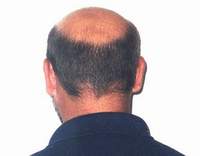Gene discovered by Russian scientists may help cure baldness
Russian scientists have discovered a gene that controls the growth of hair. An article about the discovery made by a team of scientists led by Doctor of Biological Sciences Evgeni Rogayev was recently published by the journal Science.

Basically, humans have two major problems with hair. One has to do with a lack of it in the right areas, and the other one affects those who have too much hair covering the wrong areas.
Scientists at the Medical and Genetic Center under the Russian Academy of Medical Sciences headed by its director Academician Evgeni Ginter have been carrying a research into the causes of hereditary diseases for many years. The research is focused on hereditary diseases affecting various peoples living in Russia. Scientists found an unusual genetic pathology in peoples living in the land along the Volga. Both local men and women have very little hair on the body while the hair on the head grows short and often falls out completely later.
However, the Volga phenomenon proved to be different from any known type of alopecia or baldness. Geneticists led by Professor Evgeni Rogayev, head of a laboratory of molecular genetics of the brain at the Research Center of Mental Health, looked into the case.
“Our task turned out to be an intriguing one,” said Prof. Rogayev, in an interview to Izvestia. “Firstly, the human hair grows by the cycle; a new growth of hair replaces the old one every six years. The mechanism of a cellular functioning in cyclic processes is very interesting. Secondly, the stem cells of a tubular hair follicle control the growth of a hair that actually develops inside the follicle. Those cells are the most active cells of the body. They multiply faster than cancer cells. Besides, the task looked quite interesting in terms of evolution because a human being differs from an animal by a smaller number of hairs covering his body,” said Prof. Rogayev.
Scientists were already aware of a gene that inhibited the growth of hair in mice and some representatives of the human race. As it turned out, the gene has nothing to do with the phenomenon occurring in the Volga people. Having examined 350 thousand people, scientists selected 50 families, in which the mutant gene was passed down from generation to generation. Scientists used a position cloning technique, the most advanced search method, to locate the mysterious gene in the 3rd chromosome. The area of the search was gradually narrowed to 4 genes. Once the genes were “identified,” they did not seem to have any links to the hair growth. A thorough research into the three genes was carried out, but to no avail. The two-year search could have ended in failure had the study of the fourth gene resulted in a similar fashion. A large-scale mutation was eventually located in the fourth gene. The research showed that a sizeable fragment comprising about one thousand of nucleotides had fallen out of the gene.
“The gene is a well-known genetic material that codifies the production of phospholipase,” said Rogayev. “Lipases belong to a family of ferments that breaks down glycerol into fatty acids during digestion. However, the lipase located by our team did not seem to have anything to do with the hair growth or so it looked in the past. We started to research in the work of the gene in hair follicles to find out whether the lipase could be involved in the process. As a result, we saw that the ferment’s activity got accelerated especially in areas where stem cells were located. In other words, we gathered enough evidence to prove that the gene found by our team really controls the growth of hair,” said Prof. Rogayev.
Scientists normally show a lot of caution when it comes to prospects for a scientific discovery. The newly found gene is thought to partake in the formation of lipids, a special class of fats. Perhaps those lipids will become a medicine capable of stimulating the growth of needful hair. On the other hand, the growth of unwanted hair could be hampered by suppressing the lipids in hair follicles. The above suggestions are still a theory that requires numerous experiments to support the preliminary findings. However, the discovery clearly points out the direction of further experiments. It is quite possible that in the near future we will be able to use seemingly regular yet high-tech shampoos and hair conditioners that could effectively cure baldness and eliminate unwanted hair.
Izvestia Nauki
Translated by Guerman Grachev
Pravda.ru
Join Pravda.ru forum for free! Speak your mind!
Subscribe to Pravda.Ru Telegram channel, Facebook, RSS!




